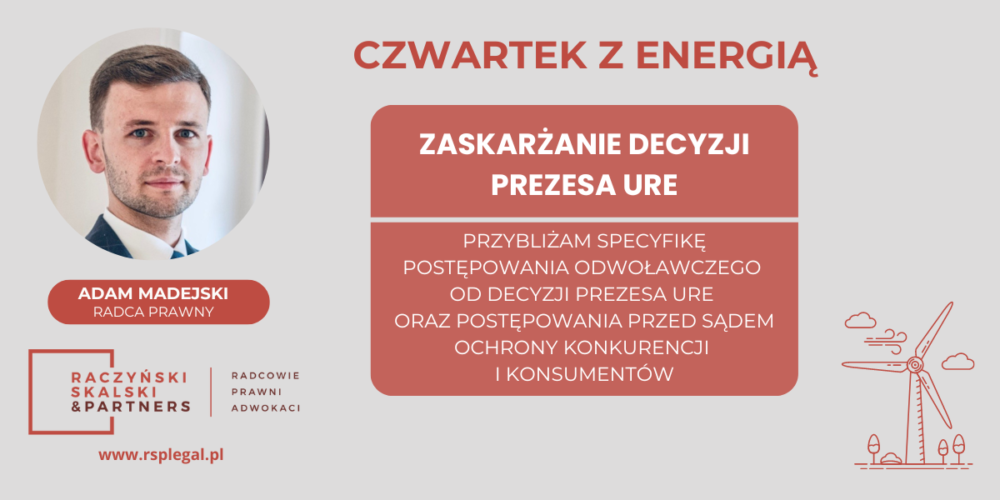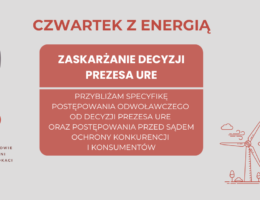The peculiarities of the procedure for appealing the decision of the President of the ERO are worth bringing up. This is because we are dealing here with a significant change from classic administrative proceedings, in which the complaint process is based on higher authorities and administrative courts. According to Article 30(2) of the Energy Law, appeals against decisions of the ERO President are filed with the District Court in Warsaw – the Court of Competition and Consumer Protection. The instance circuit thus begins before the common court.
1. Relationship between the KPA and the CCP
The reason why two separate legal regimes apply in energy law cases is that the matter of energy law is heavily regulated and, as an important element of state security, is largely under the control, direct or indirect, of the public administration and State Treasury companies. However, in order to ensure a real right to a court, appeals against decisions of the ERO President have been placed under the jurisdiction of ordinary courts – this avoids the problem where there could be a conflict of interest between the body superior to the ERO President and one of the parties, if only in the case of appeals filed by State Treasury companies supervised by the relevant ministry.
As long as the case is conducted before the ERO President, the provisions of the Administrative Procedure Code apply. This is particularly important because a party to such proceedings can invoke a number of principles contained in the code, and which are preventive, protective and disciplinary in nature, such as the principle of comprehensive collection and evaluation of evidence, the principle of speed of proceedings, the principle of building trust in public administration and the law, or the principle of transparency. However, it should be borne in mind that it is in a party’s good interest to take action on its own initiative, particularly in providing comprehensive explanations and evidence. This is all the more important because the evidence collected by the ERO President largely forms the basis for decisions before the Court of Competition and Consumer Protection – as it is rare for a party to be able to effectively supplement the evidence used to issue a decision.
It is worth bearing in mind that the Court of Competition and Consumer Protection is a substantive court, i.e. it reviews the case. As the SOKiK explained in its judgment of July 7, 2021, XVII AmE 281/20: The purpose of the proceedings is not to conduct a review of the administrative proceedings, but to resolve the case on the merits, the subject of which is a dispute between the parties arising only after the President of the Office issues a decision. Litigation before the Court of Competition and Consumer Protection is an adversarial proceeding, in which the evidence gathered in the administrative proceedings is taken into account, which, however, does not deprive the parties of the possibility of filing new factual claims and new evidence, according to the rules applicable to separate proceedings in business cases. The antitrust court is a civil court and conducts a civil case, initiated as a result of an appeal against a decision of the President of the Office, according to the rules of adversarial civil proceedings, and not a court of the legality of an administrative decision, as administrative courts do in judicial-administrative proceedings. Only such a reading of the relationship between administrative proceedings and judicial proceedings can justify the choice made by a rational legislator between the route of civil proceedings and the route of judicial-administrative proceedings to clarify the merits of the case.
This means that from the moment the appeal is filed, it is up to the applicant to ensure that the review of the contested decision in the course of the instance can take place with a full range of evidence and arguments in support of the appeal.
2. Enforceability of the decision vs. appeal
The issuance of a decision by the President of the ERO does not yet make it enforceable – it is neither final nor legally binding, so as such it cannot be enforced – unless it has been given the order of immediate enforceability pursuant to Article 108 of the CAP.
For example, in accordance with Article 41 of the Energy Law, in the case of a decision to amend or revoke a license, there is no obligation to impose the order of immediate enforceability – it is an ordinary administrative decision, which is subject to an instance review under the rules described above. However, if the statutory prerequisites are met, the entity that is the addressee of the decision will be obliged to comply with the content of the decision, unless it applies under Article 479(52) of the Code of Civil Procedure to suspend the enforceability of the decision. The exception is Article 9h(3h) of the Energy Law: The decision referred to in paragraph 3e shall be immediately enforceable. The filing of an appeal does not suspend the enforcement of the decision – a provision of Article 479(52) of the Act of November 17, 1964. – Code of Civil Procedure (Journal of Laws 2023, item 1550, as amended51)) shall not apply.
Consequently, the entity that is the addressee of the ERO President’s decision should analyze the directions on which it can base an appeal, and in the absence of granting the order of immediate enforceability, it can conduct normal business. Of course, failure to comply with the deadline for filing an appeal makes the ERO President’s decision legally binding. Then such a decision can be challenged only under the provisions of the Code of Administrative Procedure – Article 156 or 145.
3. Administrative discretion vs. common courts
One of the “sore points” in proceedings concluded with the imposition of a fine is the sphere of application of the institution of waiver of its imposition on the basis of Article 56 paragraph 6a of the Energy Law. The sphere of application of this solution lies within the so-called administrative discretion of the ERO President, which means that even if the statutory prerequisites are met, the decision to use this instrument still lies with the ERO President.
When filing an appeal based on the allegation of failure to waive punishment, it is worthwhile to carefully analyze the relevant arguments, as case law has developed quite a large body of work in this area. On the one hand, this is good information, since one can trace the sentencing trends in detail. On the other hand, the developed line of jurisprudence shows the uniqueness of the institution of waiver of punishment, which can be applied in truly exceptional situations. In addition, although the Court of Competition and Consumer Protection rules as a court of merit – a court of first instance, it has no authority to apply waiver of punishment. This is confirmed, for example, by the judgment of the Supreme Court, II NSKP 49/23: The provision of Article 56(6a) of the Energy Law is addressed to the President of the ERO. For these reasons, common courts recognizing appeals against decisions issued by this body should verify any objections in its application in terms of the legality of the actions taken by the body on its basis, thus analogously to what administrative courts do in the framework of judicial-administrative control of the activities of public administration bodies.
The SOKiK made a similar statement in its judgment XVII AmE 243/21: The President of the Energy Regulatory Authority shapes the policy of imposing penalties on entrepreneurs committing administrative torts, and court intervention in the content of the regulator’s decision should take place only when it bears the hallmarks of arbitrariness, i.e. it is based on arbitrary premises, contains perfunctory and general justification, refers to unproven information, etc. Thus, for such interference, it is necessary not only to demonstrate that the conditions fulfilled in the provision of Article 56(6a) of the Energy Law exist, but also that the authority has exceeded the rules of administrative discretion.
Consequently, it is extremely difficult to win a waiver of a fine as a result of an appeal against a decision of the ERO President. Only by demonstrating that the rules for the exercise of administrative discretion, as a power of the authority, have been exceeded, there is a chance to overturn the decision imposing the fine.



